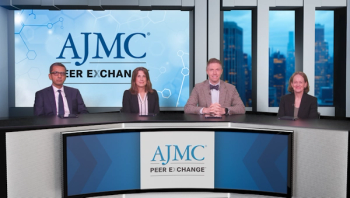
Experts discuss the promising future of HER2-targeted therapies, highlighting new treatments and combination strategies for non-small cell lung cancer.

Experts discuss the promising future of HER2-targeted therapies, highlighting new treatments and combination strategies for non-small cell lung cancer.

Experts discuss the potential of TKIs like zongertinib and seviberatinib as first-line treatments for HER2-mutant non-small cell lung cancer.

Explore the significance of patient-reported outcomes in cancer treatment, highlighting the benefits of zongertinib and its impact on quality of life.

Dr. Hirsch discusses the promising efficacy and safety of cevertinib for HER2-mutant non-small cell lung cancer, highlighting its potential as a first-line treatment.

Discover the latest insights on Zongertinib's efficacy and safety for HER2-mutant non-small cell lung cancer, promising new treatment options.

Explore the differences between emerging HER2-targeted TKIs, Zongertinib and Seviberatinib, and their therapeutic implications in cancer treatment.

Explore the latest HER2-targeted therapies for non-small cell lung cancer, including treatment options and patient-centered decision-making strategies.

Timely initiation of targeted therapy is crucial for improving cancer outcomes and patient quality of life, especially for those with HER2 mutations.

Experts discuss the critical unmet needs in HER2-mutant non-small cell lung cancer, highlighting disparities in testing and treatment access.

Experts explore HER2 mutations and the critical role of comprehensive molecular profiling in optimizing treatment for non-small cell lung cancer patients.

Panelists discuss how defining and tracking meaningful real-world outcomes ensures accountability and value in MASH management.

Panelists discuss how multidisciplinary collaboration is essential for preventing progression and improving outcomes in MASH care.

Panelists discuss how noninvasive risk assessments enable early detection and targeted management of fibrosis in MASH patients.

Panelists discuss how patients express satisfaction with digital therapeutics for their convenience and real-time accessibility, though lack of payer coverage limits the ability to gather meaningful real-world evidence on their effectiveness.

Panelists discuss how CT-155, a 16-week interactive digital application, met its primary end point in clinical trials by successfully improving experiential symptoms of schizophrenia compared with a control app, with an excellent safety profile.

Panelists discuss how integrating clinical efficacy with cost-effectiveness ensures sustainable adoption of MASH therapies.

Panelists discuss how next-generation metabolic and hepatic agents are broadening treatment options and reshaping the MASH care landscape.

Panelists discuss how combining effective antipsychotic medications for positive symptoms with digital therapeutics for negative symptoms could synergistically improve overall outcomes and help young patients achieve their life goals.

Panelists discuss how prescription digital therapeutics can expand access to specialized mental health interventions in underserved rural communities where traditional therapy resources are scarce or unavailable.

Panelists discuss how GLP-1 therapies show dual metabolic and hepatic benefits, redefining MASH management.

Panelists discuss how recognizing high-risk patients and linking liver care with metabolic management can reduce both disease and economic impact.

Panelists discuss how evolving policy reforms will reshape oncology research by balancing innovation, access, and affordability.

Panelists discuss how IRA-driven BTK inhibitor price changes could shift payer preferences, necessitating vigilance to preserve clinical integrity in treatment selection.

Panelists discuss how the IRA’s drug pricing reforms aim to improve affordability but may influence future oncology innovation.

Panelists discuss how integrating safety and access considerations into oncology policy can create more equitable, patient-centered coverage models.

Panelists discuss how utilization management limits clinical autonomy and advocate for reforms that preserve shared, patient-centered decision-making.

Panelists discuss how payers should interpret black box warnings with clinical context to prevent unnecessary restrictions on safe, evidence-based treatments.

Panelists discuss how integrating real-world evidence into coverage frameworks can enhance decision-making and align payer policies with actual patient outcomes.

Panelists discuss how outdated coverage decisions can worsen outcomes and increase costs by delaying access to safer, evidence-supported BTK inhibitor therapies.

Panelists discuss how payer coverage restrictions often conflict with NCCN guidelines for BTK inhibitor therapies in CLL, impeding evidence-based care.

Published: May 15th 2025 | Updated:

Published: March 14th 2025 | Updated:

Published: May 15th 2025 | Updated:

Published: March 7th 2025 | Updated:

Published: January 31st 2025 | Updated:

Published: January 31st 2025 | Updated:

259 Prospect Plains Rd, Bldg H
Cranbury, NJ 08512
© 2025 MJH Life Sciences®
All rights reserved.
